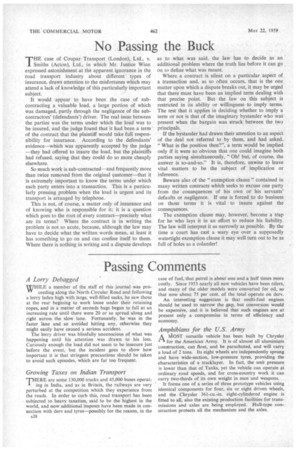No Passing the Buck
Page 30

If you've noticed an error in this article please click here to report it so we can fix it.
THE case of Coupar. Transport (London), Ltd., v. Smiths (Acton), Ltd., in which Mr. Justice Winn expressed astonishment at the apparent ignorance in the road transport industry about different types of insurance, draws attention to the misfortunes which may attend a lack of knowledge of this particularly important subject It would appear to have been the case of subcontracting a valuable load, a large portion of which was damaged, partly through the negligence of the subcontractors' (defendants') driver. The real issue between the parties was the terms under which the load was to be insured, and the judge found that it had been a term of the contract that the plaintiff would take full responsibility for insurance. According to the defendants' evidence—which was apparently accepted by the judge —they had offered to insure the load, but the plaintiffs had refused, saying that they could do so more cheaply elsewhere.
So much work is sub-contracted—and frequently more than twice removed from the original customer—that it is extremely important to know the terms under which each party enters into a transaction. This is a particularly pressing problem when the load is urgent and its transport is arranged by telephone.
This is not, of course, a matter only of insurance and of knowing who is responsible for it; it is a question which goes to the root of every contract—precisely what are its terms? Where the contract is in writing the problem is not so acute, because, although the law may have to decide what the written words mean, at least it has something to go on and can confine itself to them. Where there is nothing in writing and a dispute develops as to what was said, the law has to decide as an additional problem where the truth lies before it can go on to define what was meant.
Where a contract is silent on a particular aspect of a transaction and, as so often occurs, that is the one matter upon which a dispute breaks out, it may be urged that there must have been an implied term dealing with that precise point. But the law on this subject is restricted in its ability or willingness to imply terms. The test that it applies in deciding whether to imply a term or not is that of the imaginary bystander who was present when the bargain was struck between the two principals.
lithe bystander had drawn their attention to an aspect of the deal not referred to by them, and had asked, "What is the position then?", a term would be implied only if it were so obvious that one could imagine both parties saying simultaneously, "Oh! but, of course, the answer is so-and-so." It is, therefore, unwise to leave vital matters to be the subject of implication or inference.
Beware also of the "exemption clause" contained in many written contracts which seeks to excuse one party from the consequences of his own or his servants' defaults or negligence. If one is forced to do business on those terms it is vital to insure against the consequences.
The exemption clause may, however, become a trap for he who lays it in an effort to reduce his liability. The law will interpret it as narrowly as possible. By the time a court has cast a wary eye over a supposedly watertight exemption clause it may well turn out to be as full of holes as a colander!


































































































